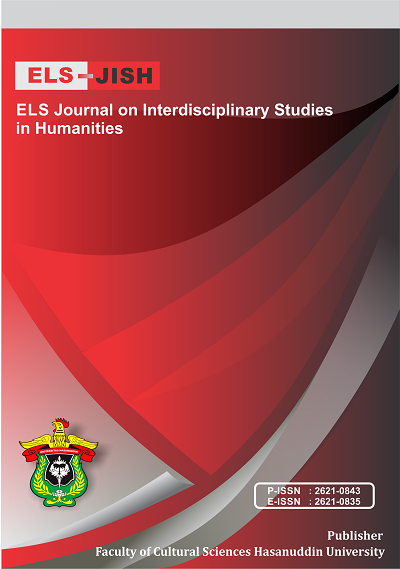Teacher’s Perceives on the Implementation of Genre-Based Approach in Teaching Writing
DOI:
https://doi.org/10.34050/elsjish.v5i3.23198Keywords:
Genre-based approach, Teaching writing, Teacher’s perceptionAbstract
The present study was focused on the teacher’s perceives on the implementation of genre-based approach (GBA) in teaching writing in one of senior high schools in Surakarta, Central Java, Indonesia. The objectives of this study are to explain; 1) The teacher’s perceptions on the practice of the genre-based approach in teaching writing, 2) the matters faced by English teacher, 3) the solutions regarding the problems faced by the teacher. This research was qualitative. The data were collected by implementing questionnaire and interview. The sample of this study was one teacher in Surakarta by using purposive sampling technique. Writers used a model of triangulation process consisting of data reduction, data display, and conclusion to collect and analyze the data. The results showed that; 1) the teacher had positive perception using GBA in teaching writing, 2) there were problems faced by the teacher such as the ease of internet access so that the students could not show their own ideas, and 3) the teachers’ suggestion was that the teacher should be up to date with the newest topic and give motivation to the students to express their own ideas.
References
Andini, C. (2021). The Use of Honorifics in English and Buginese with special Reference to Bone Language: A Comparative Study. International Journal of Innovative Science and Research Technology, 6(7), 873-877.
Antony, M. E. (1985). Approach, method, and technique in Allen, Harold. B. Teaching English technique. New York: McGraw-Hill Book Company.
Ardiansah, D. (2017). Teachers’ perceptions on the process of genre-based approach in teaching writing. International Journal for Educational Studies, 10(1), 33–42.
Bawarshi, A.S. & M.J. Reiff. (2010). Genre: An introduction to history, theory, research and pedagogy. Indiana, USA [United States of America]: Parlor Pres.
Bhatia, V. (1993). Analysing genre: Language use in professional settings. Essex: Longman.
Brown, H. D. (1994). Teaching by Principles: An interactive approach to language pedagogy. New Jersey: Prentice Hall.
Butt, D., Fahey, R., Feez, S., Spinks, S., & Yallop, C. (2001). Using functional grammar: An exploler guide. (second edition). Sydney: NCELTR.
Byram, M. (2004). "Genre and genre-based teaching" in The routledge encyclopedia of language teaching and learning. London: Routledge.
Christie, F. (2005). Language education in the primary years. Sydney: UNSW [University of New South Wales] Press.
Creswell, J. (2009). Research design: Qualitative, quantitative, and mixed methods approaches, (3rd edition). London: SAGE Publications.
Derewianka, B. (1990). Exploring How Texts Work. Sydney: Primary English Teaching Association.
Fauziati, E. (2014 ). Methods of teaching English as a foreign language (TEFL) . Surakarta: Era Pustaka Utama.
Fauziati, E. (2016). Applied linguistic: Principle of foreign language teaching, learning, and researching. Surakarta: Era Pustaka Utama.
Feez, S. (1998). Text-based syllabus design. AMES; Macquarie University, Sydney: NCELTR.
Halliday, M. A. K., & Hasan, Ruqaiya. (1976). Cohesion in English. London: Longman.
Hammond, Jenny. & National Centre for English Language Teaching and Research (Australia). (1992 ). English for social purposes: A handbook for teachers of adult literacy. Sydney, Australia: National Centre for English Language Teaching and Research.
Hancock, B. (2002). An introduction to qualitative research. Nottingham University: Trent Focus Research.
Harmer, J. (2007). The practice of English language teaching (3rd edition). Harlow, UK [United Kingdom]: Longman Pearson Education Limited.
Hassani, M.T. & M.R. Hemmati. (2013). The effect of genre-based instruction on ESP learners’ reading comprehension. Theory and Practice in Language Studies, Volume 3(6), pp.1009-1020.
Hyland, K. (2003). Second language writing. Cambridge, New York: Cambridge University Press.
Hyland, K. (2007). Genre pedagogy: Language, literacy, and L2 writing instruction. Journal of Second Language Writing, Volume 16(3), pp.148-164.
Junaidi, J., Budianto Hamuddin, B., Wendy, S., Fathu, R., & Tatum, D. (2020). ICT usage in teaching English in Pekanbaru: Exploring junior high school teachers’ problems. International Journal of Advanced Science and Technology, 29(03), 5052-5063.
Lee, I. (2003). L2 writing teachers' perspectives, practices, and problems regarding error feedback . Assessing Writing, 8(3), 216–237.https://doi.org/10.1016/j.asw.2003.08.002.
Maba, W. (2017). Teachers’ perception on the implementation of the assessment process in 2013 curriculum. International Journal of Social Sciences and Humanities,, 1(2), 1-9.
Malik, R.S. & F.A. Hamied. (2014). Researcher methods: A guide for first time researcher. Bandung: UPI [Universitas Pendidikan Indonesia] Press.
Marsudiono. (2006). Writing II: Material for semester two of the English department writing series. Ponorogo: Muhammadiyah University of Ponorogo.
McKay, P. (2008 ). Assessing young language learners. Cambridge: Cambridge University Press.
Miles, M.B. & A.M. Huberman. (1994). Qualitative data analysis: An expanded sourcebook (2nd edition). USA [United States of America: SAGE Publication, Inc.
Murcia, M. (Ed). (2001). Teaching English as a second or foreign language (3rd edition). Boston, MA: Heinle & Heinle.
Nunan, D. (1991). Language teaching methodology: A textbook for teachers. London: Prentice Hall.
Paltridge, B. (1996). Genre, text type, and the language learning classroom. ELT Journal, 50(3), 237-243.
Rahman, F., Eryck, M. F., & Munirah, M. (2022). Plagiarism Occur In Students’academic Work, Exploring Impact The Efl (English As Foreign Language) Undergraduate Students’plagiarism In Theses Writing. ZONAsi: Jurnal Sistem Informasi, 4(1), 52-63.
Raimes, A. (1992). Exploring through writing: a process approach to ESL composition (2nd edition). New York: St. Martin’s Press.
Richards, J., & Rodgers, T. (2001 ). Approaches and methods in language teaching . New York: Cambridge University Press.
Swales, J. (1990). Genre analysis: English in academic and research settings. Cambridge, UK [United Kingdom]: Cambridge University Press.
Vygotsky.L. (1978). Mind in society. Cambridge MA: Harvard University Press.
Downloads
Published
How to Cite
Issue
Section
License
Copyright (c) 2022 Anjar Nur Cholifah, Reza Pustika, Ardesia Winanta

This work is licensed under a Creative Commons Attribution-NonCommercial-ShareAlike 4.0 International License.






